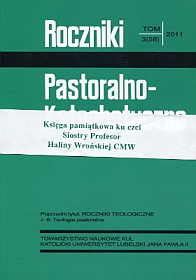Miłość jako wartość moralna w pracy edukacyjnej nauczyciela religii
Abstrakt
The religion teacher performs a significant role in religion teaching at school. One of the meaningful elements of this service is love understood as moral value. Hence, answers have been sought to the following questions: what role is played by love in the religion teacher’s educational work? What factors condition the religion teacher’s educational work that is inspired by love? Answering these questions first the author tried to explain the terms that are key ones for the issue addressed in the present article, i.e. “love”, “value”, “the religion teacher’s work”. She refers here to personalistic philosophy and pedagogy as well as to theology. Against the background of these concepts the questions that are fundamental for the catechetical service are shown, as they are based on Christian axiology. It is shown that love understood first of all as an encounter with another man, affirmation of his person, being a gift for him, showing kindness to him, appears as a significant moral value in the religion teacher’s educational work. It is in the center of catechetical service and protects one from pragmatism or instrumentalism, contributing to building genuine bonds with God and with another man.
Bibliografia
Dyrda K.: Modlitewna formacja katechetów. Tarnów 2008.
Jędrzejewski W.: Katecheta w „ringu”. Poznań 2007.
Katecheza, rodzina, parafia i szkoła. T. 7: Katecheta wychowawcą kreatywnego i refleksyjnego ucznia. Red. J. Szpet, D. Jackowiak. Poznań 2009.
Kosińska E.: Katecheta w szkole. Kraków 1999.
Okońska E.: Nauczyciel religii w szkole. Tezy. Poszukiwania. Propozycje. Bydgoszcz 2006.
Szpet J.: Prawa i obowiązki katechety w szkole. Płock 1997.

